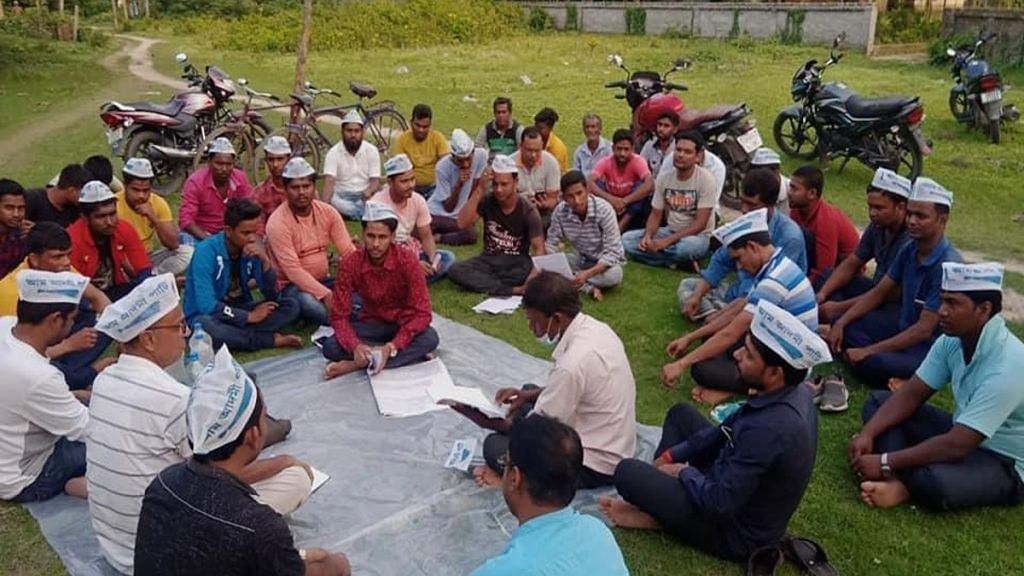Kolkata: Looking to expand its footprint in the east, Arvind Kejriwal’s Aam Aadmi Party (AAP) will be contesting next year’s panchayat polls in West Bengal, and has already started laying the groundwork for its participation.
The party feels that the “winning template” of Delhi and Punjab can be tested in West Bengal. With a focus on anti-corruption, it has begun raising area-specific issues to connect with the people, instead of concentrating only on overall state-related matters.
This will be the second time the AAP steps into Bengal’s electoral arena.
“The AAP was launched in West Bengal in 2014, [and] we fought the Lok Sabha elections that year itself. But then we realised that we need to strengthen our organisational structure, a reason why we skipped the 2021 Vidhan Sabha elections in West Bengal. But our groundwork never stopped,” the party’s Bengal in-charge Sanjay Basu told ThePrint.
In the 2014 elections, AAP had contested from Kolkata South, Kolkata North, Barrackpore, Howrah and Raiganj constituencies of West Bengal, but lost in four of them while one of the candidates had withdrawn from the contest on grounds of poor health. Overall, it had fielded over 400 candidates across the country, but secured just four seats in Punjab.
Citing an example of the area-specific issues that his party has been raising, Basu said, “AAP has highlighted how the Mamata Banerjee government failed to fulfil its ‘Karma Tirtha’ development project to create jobs and help the MSME (micro, small and medium enterprises) sector. The buildings were mostly lying vacant when our volunteers personally visited these sites. The chief secretary took note of our press conference and alerted the district magistrates back in April.”
The ‘Karma Tirtha’ is a flagship programme of the Bengal government aimed at promoting sustainable entrepreneurship and generating employment in form of organised marketing. Under this initiative, state-owned buildings were set up as ‘Karma Tirthas’ to house stalls as well as temporary accommodation for economically weak micro artisans/entrepreneurs.
As a “people-driven party”, the AAP is set to hold at least 100 programmes over the next few months to pinpoint area-wise issues, and be a “silent game-changer”, like in the case of Punjab, Basu said.
Also Read: Why AAP is turning up its nose at joining Mamata’s proposed non-BJP opposition front
Structural strengthening
Of the 16 district committees that have already begun work, the AAP is restructuring 12, which will be ready by the end of May. Through its membership drives, over one lakh volunteers have joined the party in West Bengal, Basu said, adding that there has been a marked rise in membership since the Punjab assembly poll results were declared in March.
Asked about the party state unit’s composition, Basu said 80 per cent of AAP workers in Bengal are between 25 and 35 years of age. “Our motto is simple, ‘neta out, janta in’,” he added.
The AAP will primarily focus on door-to-door connect as its backbone in West Bengal, he said.
“We give money from our pockets to run this party. That’s our level of commitment. Our politics is different. See Swati Maliwal, chief of the Delhi Commission for Women, she’s a strong voice and has done a great deal of work in New Delhi,” he added. “That is missing in Bengal and is the need of the hour. The AAP identifies the problems and implements the solutions. We walk the talk.”
‘AAP will not join hands with TMC’
In January 2019, Delhi Chief Minister Arvind Kejriwal joined the ‘United Opposition’ stage in Kolkata following an invite from his West Bengal counterpart Mamata Banerjee. Last month, he visited the Bengal CM at her nephew and Trinamool Congress (TMC) MP Abhishek Banerjee’s Delhi residence, which according to the TMC was a “courtesy call”.
However, the AAP has ruled out an alliance with Bengal’s ruling party. “AAP doesn’t ally with mainstream political parties. But if it’s a lesser known politically active organisation, for example, a tribal group fighting for their rights, the AAP will join forces with them,” Basu said. “But at this stage, our central leadership has made it clear, we will not join hands with TMC.”
Trinamool Congress vice-president Yashwant Sinha told ThePrint that the “AAP has adopted the policy of not tying up with any party, but only with the people of the country”. “It has a single-minded pursuit. In my opinion, AAP doesn’t care, because it has a long-term goal and not short-term electoral ones,” he said.
What political analysts say
Political experts have opposing views on the AAP’s prospects in Bengal.
“The AAP will not get any space in West Bengal for panchayat polls, in terms of even putting up candidates. The present scenario in the state is like how Bihar was under Lalu Prasad,” said Bishwanath Chakraborty, a professor of political science at Kolkata’s Rabindra Bharati University.
“However, the AAP can penetrate and connect with the people if they constantly highlight and fight against social issues, because the BJP will never get the Muslim support here, and the AAP can use that to its advantage,” he added.
Udayan Bandyopadhyay, author and professor of political science at Bangabasi College in Kolkata, said: “Any party can contest any election, but taking into consideration the political scenario of West Bengal, I don’t think the AAP will be able to win a single seat in any panchayat because it is politically polarised.
“In rural Bengal, violence has a role to play and, if violence takes place, the AAP doesn’t stand a chance.”
(Edited by Gitanjali Das)
Also Read: After decimating traditional parties to emerge as Punjab’s new No.1, AAP now eyes national role
